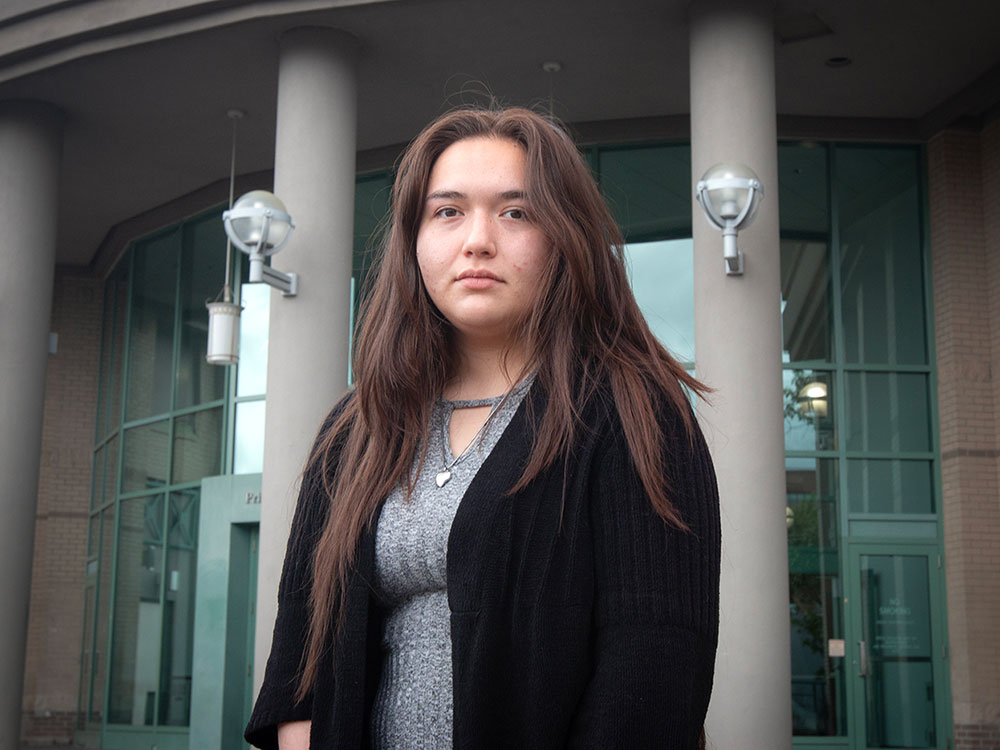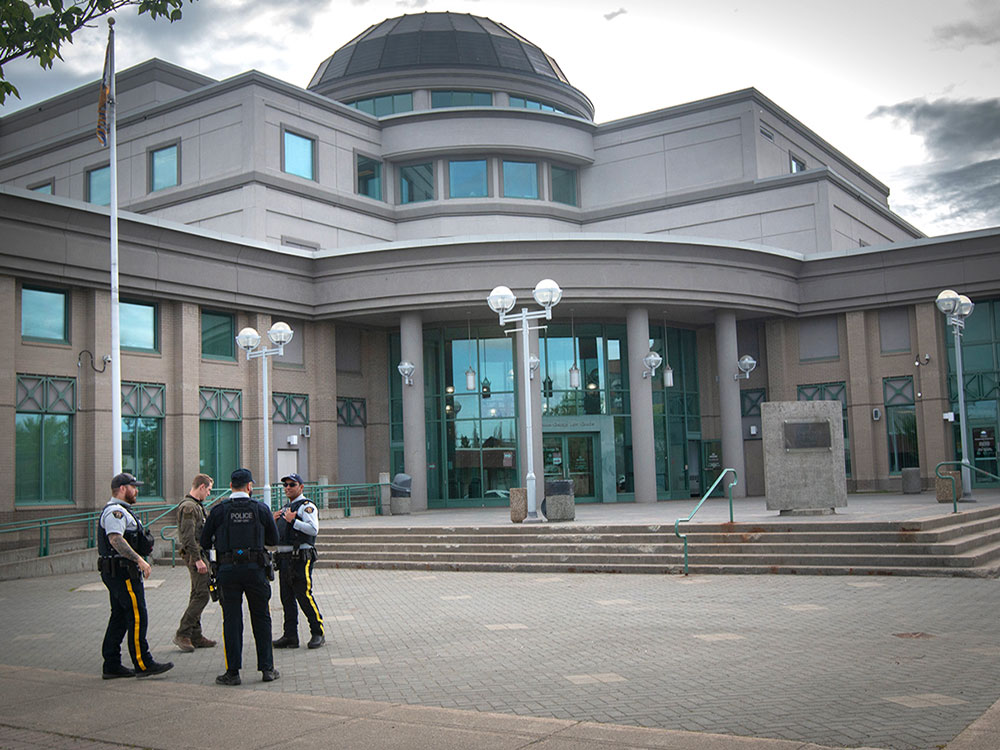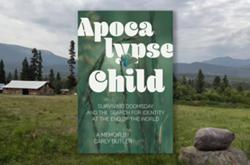Nearly seven years after her father died while being taken into police custody, Lily Speed-Namox was at the Prince George courthouse yesterday morning as the trial got underway for two RCMP officers charged with attempting to obstruct justice following his death.
Speed-Namox, who was 14 when her father, Dale Culver, died on July 18, 2017, has been present at court appearances since charges were laid more than a year ago.
“There hasn’t been a single day, hour, minute that I’ve missed,” she said.
The trial, which was scheduled to start Monday, was delayed for several days as B.C. provincial court judge Adrian Brooks heard pretrial applications regarding the admissibility of the officers’ handwritten notes, which were provided to investigators in the days following Culver’s death.
Brooks ruled Thursday morning that Crown prosecutors could use them.
It took nearly six years for the BC Prosecution Service to lay charges against five police officers involved in Culver’s death.
On Feb. 1, 2023, BCPS announced manslaughter charges against Const. Paul Ste-Marie and Const. Jean Francois Monette.
At the same time, it charged Const. Arthur Dalman, Sgt. Bayani Eusebio Cruz and Const. Clarence Alexander MacDonald with attempting to obstruct justice, allegedly related to the deletion of video from a bystander’s cellphone.
All but two of those charges have been abandoned. On April 5, BCPS announced a stay of proceedings in the manslaughter case after Crown prosecutors determined that conflicting pathology reports meant there was no longer a likelihood of conviction.
Then, last month, the obstruction charge against MacDonald was also stayed. BCPS said it would provide reasons for the decision after the conclusion of the current trial.
Standing outside the Prince George courthouse this week, Speed-Namox acknowledged that this isn’t the trial she and her family had hoped for. But she said she would be there as a witness and a voice for her father, who will never have the chance to tell his own story.
“It might not be the trial that we were hoping for, but the fact that we’re getting a trial is all that matters,” she said. “To finally see somebody having to take accountability for their actions in the police department and their entire organization.”

Culver’s death
On July 18, 2017, Dale Culver, who was Wet’suwet’en and Gitxsan, was riding his BMX bike though downtown Prince George shortly after 10 p.m., according to a BCPS statement.
When a police officer approached him after receiving a complaint of someone casing vehicles in the area, he reportedly rode away. The officer determined that Culver was arrestable, either for not stopping for police or because he was not wearing a helmet.
A chase began, with the officer following Culver in his vehicle and then on foot, eventually catching up to him and pulling him off his bike. A struggle ensued and the officer pressed a panic button to alert police in the area, BCPS said.
During the arrest that followed, roughly seven RCMP officers surrounded Culver, the statement said. He was pepper-sprayed in the face and punched in the head and sustained blows to other parts of his body. “I can’t breathe,” he told the officers at one point.
Once handcuffed and placed in a police vehicle, Culver continued to complain that he was struggling to breathe. He collapsed and died about a half-hour after his altercation with police.
While the original autopsy blamed the pepper spray and a head injury as contributing factors in his death, a review of the pathology disagreed, saying Culver had died from a heart condition and officers were not criminally responsible.
The day after Culver’s death, B.C.’s police watchdog, the Independent Investigations Office, sent investigators to Prince George. The IIO is responsible for investigating police-involved incidents resulting in death or serious harm.
But the investigators soon found themselves in a tricky position. As they investigated the potential for criminality involving use of force against Culver, they realized there was a second, parallel investigation emerging — allegations that police officers at the scene had asked a witness to delete video evidence from his cellphone.
Witnesses? Or suspects?
During pretrial applications, the court heard that the IIO walked a thin line as it scrutinized the concurrent investigations, with officers who were witnesses to Culver’s death also potential suspects in the obstruction investigation.
IIO investigators can compel evidence from witness officers, the court heard, which requires the officers to provide things like handwritten notes and interviews. But as subject officers — defined by the IIO as “an officer whose presence, action or decision is reasonably believed to be connected to the death or serious harm that occurred” — their participation in an investigation is voluntary.
MacDonald, who was designated a subject officer in the use-of-force investigation, was offered legal counsel early in the process. He declined to provide a statement, the court heard.
Lawyers for Dalman and Cruz argued that their clients were never told that they might be suspects in a second investigation as they were being interviewed about Culver’s death, nor were they warned that they had the right to silence or legal counsel — a potential violation of their Charter rights.
Defence lawyer Brian Gilson, representing Cruz, argued that the IIO had options as it faced this dilemma. It could have “hived off” the second obstruction investigation, he suggested.
“The IIO is not, so to speak, the only game in town,” Gilson said, adding that there are “other avenues” for investigating police officers. He named two RCMP units, the Professional Standards Unit and Anti-Corruption Unit, or other police agencies, such as Surrey or Alberta, that could have handled the file.
Simon Bradshaw, an IIO team director who was an investigator in 2017, said that would have defeated the purpose of the police watchdog.
“We wouldn’t do that ordinarily because then you’d have the police investigating the police again, which is the whole reason we were created,” Bradshaw said. “From a perception point of view, it’s terrible.”
Gilson also suggested that the IIO could have created a separate investigation team, “insulated” from the original investigation. In final arguments, he said he “didn’t buy” Bradshaw’s testimony that the police watchdog was under-resourced and unable to shift the file to a separate team.
Defence lawyers sought to have the officers’ handwritten notes and entries into an RCMP database deemed inadmissible, arguing that using the compelled evidence against them was a deliberate abuse of state power.
But Crown prosecutors argued that the handwritten notes were created in a professional capacity and that the officers had no reasonable expectation of privacy.
“They can’t stop the investigation of Mr. Culver just because they suspect these members of other offences,” Crown prosecutor Shannon Gerrie argued. “If there is a privacy interest in these notes or if they are compelled in some way, it’s minimal.”
On Thursday morning, Judge Brooks announced that he would allow the officers’ notes to be entered as evidence and would provide details about his reasons at a later date. The trial began immediately after.
Crown prosecutor Cory Lo said the BCPS planned to call eight witnesses. They include an IIO investigator and an RCMP staff sergeant. Both testified Thursday morning. Also taking the stand this week is the bystander whose cellphone video was allegedly deleted.
Asked what she hoped would come from the trial, Speed-Namox said she would like to see the RCMP officers lose their jobs or face jail time.
The charge of attempting to obstruct justice, when Crown proceeds by indictment as it has in this case, comes with a maximum prison sentence of 10 years.*
“[The defence lawyers] speak for how Cruz and Dalman were feeling,” she said as the trial got underway. “Do you know how [Culver] was feeling? Did you speak to the dead man? Did you ask him how he was feeling?
“He can’t speak for himself. Lucky they can, because they’re still breathing.”
The trial is scheduled to continue in Prince George until June 27.
* Story updated on Monday, June 17 at 12:23 p.m. to correct the maximum sentence for obstruction of justice in this case. ![]()
Read more: Rights + Justice

















Tyee Commenting Guidelines
Comments that violate guidelines risk being deleted, and violations may result in a temporary or permanent user ban. Maintain the spirit of good conversation to stay in the discussion and be patient with moderators. Comments are reviewed regularly but not in real time.
Do:
Do not: